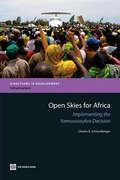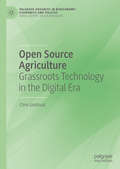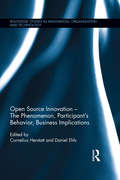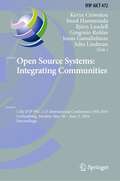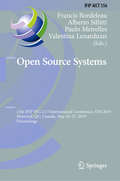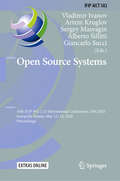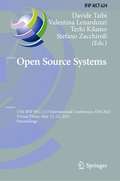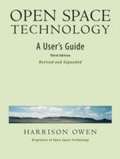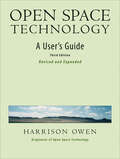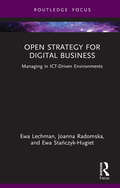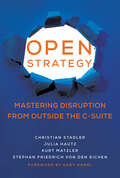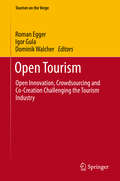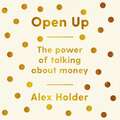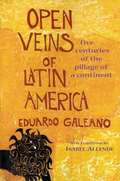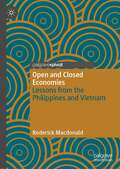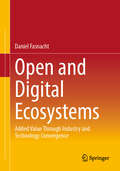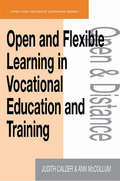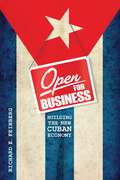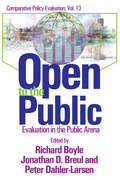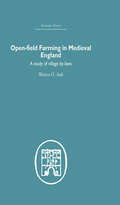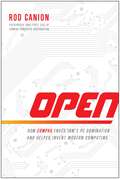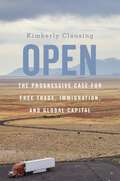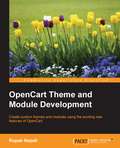- Table View
- List View
Open Skies for Africa: Implementing the Yamoussoukro Decision
by Charles E. SchlumbergerIn Africa, where poor roads, ports, and railways often constrain efficient transportation, air transport holds great potential as a lever for economic growth and development. Yet Africa has suffered several decades of inefficient air services. Uncompetitive flag carriers, set up by newly independent African states, offered primarily intercontinental flights, while the domestic air service market remained underdeveloped and underserved. The 1999 pan-African treaty on liberalization of access to air transport markets, the Yamoussoukro Decision, attempted to address these shortcomings. Yet a decade later, only partial liberalization has been achieved. 'Open Skies for Africa: Implementing the Yamoussoukro Decision' reviews progress made in carrying out the treaty and suggests ways in which the liberalization process can be encouraged. The book analyzes the completed and still-pending steps toward implementation of the Yamoussoukro Decision, both on a pan-African level and within various regions. Special focus is given to the challenges posed by the poor aviation safety and security standards that exist in most African countries. Finally, the book measures the impact that certain policy steps of the Yamoussoukro Decision have had and evaluates the economic significance of air transportation and its full liberalization in Africa. The book concludes that the process of liberalizing African air services must continue, and provides policy recommendations for the way forward.
Open Source Agriculture: Grassroots Technology in the Digital Era (Palgrave Advances in Bioeconomy: Economics and Policies)
by Chris GiotitsasThis Palgrave Pivot employs the concept of open source agriculture as a new social movement, which not only advocates a specific agenda but also creates technological products under a unique technology development model. The book brings together social movement and technology theory to examine it through two in-depth case studies of open source agricultural communities. This allows for the tracing of values and interests coded within the technological artefacts the communities produce, as well as their development processes. Critical theory of technology is further applied to examine the broader political economy of the development model.
Open Source Innovation: The Phenomenon, Participant's Behaviour, Business Implications (Routledge Studies in Innovation, Organizations and Technology)
by Cornelius Herstatt Daniel EhlsOpen Source Innovation (OSI) has gained considerable momentum within the last years. Academic and management practice interest grows as more and more end-users consider and even participate in Open Source product development like Linux, Android, or Wikipedia. Open Source Innovation: Phenomenon, Participant Behaviour, Impact brings together rigorous academic research and business importance in scrutinizing OCI from three perspectives: The Phenomenon, Participants' Behavior, and Business Implications. The first section introduces OCI artefacts, including who is participating and why, and provides a systematic overview of the literature. The second section stresses the behaviour of participants, highlighting participation progression, community selection, user entrepreneurship and fair behaviour, and answering key questions like how to manage governance rules, openness and community design aspects. The third explores the impact and implications of OSI for firms and economies by evaluating business models, uncovering opportunities for firms to interact with communities, and presenting value capture mechanisms. Open Source Innovation provides a full picture of the movement to help readers understand and engage with OSI from the micro perspective of individuals, to the community, to the macro perspective of firms and economies.
Open Source Systems: 12th IFIP WG 2.13 International Conference, OSS 2016, Gothenburg, Sweden, May 30 - June 2, 2016, Proceedings (IFIP Advances in Information and Communication Technology #472)
by Kevin Crowston Imed Hammouda Björn Lundell Gregorio Robles Jonas Gamalielsson Juho LindmanThis book constitutes the refereed proceedings of the 12th International IFIP WG 2.13 International Conference on Open Source Systems, OSS 2016, held in Gothenburg, Sweden, in May/June 2016. The 13 revised full papers presented were carefully reviewed and selected from 38 submissions. The papers cover a wide range of topics related to free, libre, and open source software, including: organizational aspects of communities; organizational adoption; participation of women; software maintenance and evolution; open standards and open data; collaboration; hybrid communities; code reviews; and certification.
Open Source Systems: 15th IFIP WG 2.13 International Conference, OSS 2019, Montreal, QC, Canada, May 26–27, 2019, Proceedings (IFIP Advances in Information and Communication Technology #556)
by Alberto Sillitti Francis Bordeleau Paulo Meirelles Valentina LenarduzziThis open access book constitutes the refereed proceedings of the 15th IFIP WG 2.13 International Conference on Open Source Systems, OSS 2019, held in Montreal, Quebec, Canada, in May 2019.The 10 revised full papers and 5 short papers presented were carefully reviewed and selected from 35 submissions. The papers cover a wide range of topics in the field of free/libre open source software (FLOSS) and are organized in the following thematic sections: mining OSS data; organizational aspects of FLOSS projects; FLOSS adoption; FLOSS cost and licenses; and FLOSS education and training.
Open Source Systems: 16th IFIP WG 2.13 International Conference, OSS 2020, Innopolis, Russia, May 12–14, 2020, Proceedings (IFIP Advances in Information and Communication Technology #582)
by Giancarlo Succi Alberto Sillitti Vladimir Ivanov Artem Kruglov Sergey MasyaginThis book constitutes the refereed proceedings of the 16th IFIP WG 2.13 International Conference on Open Source Systems, OSS 2020, held in Innopolis, Russia, in May 2020.* The 12 revised full papers and 8 short papers presented were carefully reviewed and selected from 42 submissions. The papers cover a wide range of topics in the field of free/libre open source software (FLOSS) and discuss theories, practices, experiences, and tools on development and applications of OSS systems, with a specific focus on two aspects:(a) the development of open source systems and the underlying technical, social, and economic issue, (b) the adoption of OSS solutions and the implications of such adoption both in the public and in the private sector.*Due to the COVID-19 pandemic, the conference was held virtually.
Open Source Systems: 17th IFIP WG 2.13 International Conference, OSS 2021, Virtual Event, May 12–13, 2021, Proceedings (IFIP Advances in Information and Communication Technology #624)
by Stefano Zacchiroli Valentina Lenarduzzi Davide Taibi Terhi KilamoThis book constitutes the refereed proceedings of the 17th IFIP WG 2.13 International Conference on Open Source Systems, OSS 2021, held virtually in May 2021.The 4 full papers and 3 short papers presented were carefully reviewed and selected from 23 submissions. The papers cover a wide range of topics in the field of free/libre open source software (FLOSS) and discuss theories, practices, experiences, and tools on development and applications of OSS systems, with a specific focus on two aspects:(a) the development of open source systems and the underlying technical, social, and economic issue, (b) the adoption of OSS solutions and the implications of such adoption both in the public and in the private sector.
Open Space Technology: A User's Guide (3rd edition)
by Harrison OwenWhat if you could identify a mission-critical issue for your organization, bring together the people with something to contribute and something at stake, focus on that issue and take decisive action all in the same meeting? A fantasy? Not with the application of Open Space Technology. Open Space Technology is a methodological tool that enables self-organizing groups of all sizes to deal with hugely complex issues in a very short period of time. Authored by the originator of Open Space Technology, Open Space Technology: A User's Guide details what needs to be done before, during, and after an Open Space event. It is the most authoritative book available on how to plan and run a successful Open Space event. This 3rd edition adds a survey of the current status of Open Space Technology around the world, an updated section on the latest available technology for report writing (a key aspect of the Open Space process), and an updated list of resources.
Open Space Technology: A User's Guider
by Harrison H OwenOpen Space Technology: A User’s Guide is just what the name implies: a hands-on, detailed description of facilitating Open Space Technology (OST). OST is an effective, economical, fast, and easily repeatable strategy for organizing meetings of between 5 and 2,000 participants that has been used in thousands of organizations in 134 countries and just keeps growing in popularity. Written by the originator of the method, this is the most authoritative book on the rationale, procedures, and requirements of OST. OST enables self-organizing groups of all sizes to deal with hugely complex issues in a very short period of time. This step-by-step user’s guide details what needs to be done before, during, and after an Open Space event. Harrison Owen details all the practical considerations necessary to create Open Space. He begins with the most important question—should you use Open Space at all?—and examines what types of situations are appropriate for Open Space Technology and what types are not. He then goes on to look at nuts-and-bolts issues such as supplies, logistics, and who should come and how you should go about getting them there. This third edition adds a survey of the current status of Open Space Technology around the world, an updated section on the latest available technology for report writing (a key aspect of the Open Space process), and an updated list of resources.
Open Strategy for Digital Business: Managing in ICT-Driven Environments (ISSN)
by Ewa Lechman Ewa Stańczyk-Hugiet Joanna RadomskaThis book offers the reader a novel perspective on how digital contexts and open strategy approaches – the act of opening up strategic initiatives beyond company managers to involve front-line employees, stakeholders, and entrepreneurs – are related.Going beyond the claim that digital media drives open strategy by containing a detailed analyses of the interrelations between the two, the authors examine how ICT have diffused globally and trace the emerging links between digitally driven environments and open strategizing approaches. This book also draws a general picture of how and why digital technologies create new networks. A more competitive, transparent, empowered, and inclusive environment would enhance development and encourage novel approaches to strategies implemented. Real-life exemplifications of how and why digital technologies contribute to open strategizing are also provided. Various drivers impacting the necessity to develop more relational advantage are discussed and intertwined with the description of challenges observed in the case of imposing openness.A useful resource for researchers of strategic management and information systems, as well as those looking at digital strategy and transformation.
Open Strategy: Mastering Disruption from Outside the C-Suite (Management on the Cutting Edge)
by Christian Stadler Kurt Matzler Julia Hautz Stephan Friedrich von den EichenHow smart companies are opening up strategic initiatives to involve front-line employees, experts, suppliers, customers, entrepreneurs, and even competitors.Why are some of the world&’s most successful companies able to stay ahead of disruption, adopting and implementing innovative strategies, while others struggle? It&’s not because they hire a new CEO or expensive consultants but rather because these pioneering companies have adopted a new way of strategizing. Instead of keeping strategic deliberations within the C-Suite, they open up strategic initiatives to a diverse group of stakeholders—front-line employees, experts, suppliers, customers, entrepreneurs, and even competitors. Open Strategy presents a new philosophy, key tools, step-by-step advice, and fascinating case studies—from companies that range from Barclays to Adidas—to guide business leaders in this groundbreaking approach to strategy. The authors—business-strategy experts from both academia and management consulting—introduce tools for each of the three stages of strategy-making: idea generation, plan formulation, and implementation. These are digital tools (including strategy contests), which allow the widest participation; hybrid digital/in-person tools (including a &“nightmare competitor challenge&”); a workshop tool that gamifies the business model development process; and tools that help companies implement and sustain open strategy efforts. Open strategy has an astonishing track record: a survey of 200 business leaders shows that although open-strategy techniques were deployed for only 30 percent of their initiatives, those same initiatives generated 50 percent of their revenues and profits. This book offers a roadmap for this kind of success.
Open Tourism
by Roman Egger Igor Gula Dominik WalcherThis book examines the concepts of open innovation, crowdsourcing and co-creation from a holistic point of view and analyzes them considering their suitability to the tourism industry. Methods, theories and models are discussed and examined regarding their practical applicability in tourism. The book illustrates the theoretical mechanisms and principles of Open Innovation, Crowdsourcing and Co-creation with case studies and best practices examples. In addition to the scientific target group, the book is a useful resource for managers of the entire tourism industry. First, the book presents the theoretical fundamentals and concepts in 11 specific chapters. This basis is then enriched by three parts with case studies, focusing on information, creation and provision respectively. Finally in a concluding part the editors sum up the book and give an outlook on the implications, learnings and future perspectives of open innovation, crowdsourcing and collaborative consumption in the tourism industry.
Open Up: The Power of Talking About Money
by Alex HolderEver struggled to say 'no' to an expensive dinner with friends? Found yourself unable to ask for a payrise even though you deserved it? Got stuck in an overdraft and felt too ashamed to tell anyone?From friendships, to ambitions, to mental health, money plays a huge role in our lives and relationships, yet we're often too polite or embarrassed to talk about it. But in an age of pay-gap exposés and growing inequality, conversations about money are more important than ever.The Money Book is an outspoken, warm and timely book that destigmatises the way we talk, think and feel about money. It's full of conversations about money in everyday life - how we earn it, how we spend it and how it affects us. Whether learning from friends, being transparent with partners, finding community with colleagues or recognising what you're worth, talking about money means letting go of shame, and creating a healthy relationship with your finances. Full of sympathetic, practical advice on everything from mindfulspending to the freelance jump and how to challenge the status quo, this is a book that strips away the awkwardness, to help you find the power and solidarity of talking about money.
Open Veins of Latin America: Five Centuries of the Pillage of a Continent
by Eduardo Galeano"Open Veins of Latin America: Five Centuries of the Pillage of a Continent" is an informative, insightful, colorful, yet biased view of the failures of Latin America explained through the lens of a leftist ideology.
Open and Closed Economies: Lessons from the Philippines and Vietnam
by Roderick MacdonaldThis book compares the experiences of the Philippines and Vietnam to gain insight into how openness to trade and financing can increase prosperity. In contrast, theoretical and empirical work in the 20th and early 21st centuries have returned mixed results regarding this assertion. The book also demonstrates the impracticality of any attempt to pursue prosperity in isolation. Chapter 1 discusses recent data and research on international trade and capital mobility. Chapter 2 describes the economy of Vietnam that has grown rapidly since beginning to open in 1994. Chapter 3 relates the stagnation of the Philippines as it remained closed from 1960 to 1994 and examines the recent rapid growth in spite of the continued relative restrictiveness of Philippine policy. Chapter 4 compares the two experiences and then conjectures about the feasibility of a prosperous autarky.
Open and Digital Ecosystems: Added Value Through Industry and Technology Convergence
by Daniel FasnachtDive into the fascinating world of digital disruption and discover the transformative power of open and digital ecosystems, which will constitute one-third of global trade by 2030. This book demonstrates how value creation occurs beyond organizational boundaries and places the consumer at the forefront. The convergence of industries and technologies drives the experience-oriented customer journey and accelerates digital transformation. Explore Artificial Intelligence, Augmented Reality, the Internet of Things, Blockchain, Cloud, and Quantum Computing as key building blocks for innovation. The golden triangle of digital ecosystems - commerce, social media, and finance – illustrates how companies like Alibaba, Tencent, NIO, Alphabet, Apple, Amazon, and Migros create unique customer experiences and integrate services with super-apps. Through in-depth analyses and practical case studies, you will learn how companies can thrive in this revolutionary model, achieving growth by sharing knowledge and resources, responding swiftly to market changes, and balancing the optimization of existing businesses with the exploration of new opportunities. Leadership in open and digital ecosystems demands a shift in mindset and the development of new dynamic capabilities. Emphasizing openness, agility, and ambidexterity as critical skills, this book is an indispensable guide for companies aiming to leverage open and digital ecosystems for sustainable growth and to build agile, resilient organizations. Gain a modern understanding of leadership and discover how it shapes the future of work in the era of digital ecosystems.
Open and Flexible Learning in Vocational Education and Training (Open and Flexible Learning Series)
by Judith Calder Ann McCollumThis text reviews the strategies adopted in a range of behaviourist approaches to the setting and realization of standards - identifying the background from which they emerged and ways in which they might be further developed.
Open for Business: Building the New Cuban Economy
by Richard FeinbergAn expert guide to Cuba's economic opening to the outside world.Ninety miles across the Straits of Florida, an exciting new revolution is afoot. This time, instead of guerillas marching down the streets of Havana, it is a global economy that will upend Cuba. Now opening to the world, what new forms is this nascent economy likely to take?Open for Business: The New Cuban Economy, Richard E. Feinberg's new book, examines the Cuban economy as it makes its early steps into developing a more dynamic market economy. He examines key issues like the role foreign investors will play, how Cubans will forge a path to entrepreneurship, and the roadmaps suggested by other emerging economies.As Cuba's economy awakens from the post-Castro dream, it will do so with a flavor that is uniquely Cuban. Feinberg's book-enriched by interviews and in-depth field research conducted over the last five years-speaks both to Cuba's legacy and to its new horizons on the world stage.
Open to the Public: Evaluation in the Public Sector (Comparative Policy Evaluation Ser.)
by Jonathan D. BreulOpen to the Public grows out of concern with evaluation in the public arena and the struggle to understand how best to use the information it generates. Many concepts and models of evaluation, how to undertake it, and how to make it more useful, were developed before government performance became of so much interest to the public. In fact, it is arguable that recent changes in the forms, shapes, structures, and media through which the information developed in the process of evaluation becomes public, require new ways of thinking about its role in society. What is the role of evaluative information in the public arena today? How, when, and under what circumstances does the actual use of evaluative information take place, and what are the forces at play? By compiling and comparing international case studies, this book considers forces that make the information produced in evaluations increasing ""open to the public."" They provide insights into the many factors that influence evaluation and its use in the public arena. Their case studies include such current topics as: ""spin doctoring"" of information by the media and this practice's relationship to evaluation studies, the hotly debated issue of school performance, and information about it aired in the public arena, and the controversial link between budget processing and government performance. This book will be invaluable to those conducting evaluations, public employees and commissioners, and those studying public administration.
Open-Field Farming in Medieval Europe: A Study of Village By-laws
by Warren AultThis book presents a detailed account of the co-operative practice of agriculture in medieval England, shedding much light on how medieval villagers governed their own affairs. During this period co-operation was essential in ploughing, sowing and reaping, with communal control of the pasturing of the fallow and stubble. These practices were set out in customary by-laws which were agreed to by common consent and villages themselves were greatly involved with their enactment and enforcement. In the course of time, many of the by-laws were put into writing. Professor Ault has travelled extensively throughout England collecting and researching these agrarian ordinances and translating them into modern English. Since it was first published in 1972 this analysis has provided new insight into the organizational structure and governance of medieval villages in England and is essential reading for all those interested in the history of the Middle Ages.
Open: How Compaq Ended IBM's PC Domination and Helped Invent Modern Computing
by Rod CanionThe story of Compaq is well-known: Three ex-Texas Instruments managers founded Compaq with modest venture funding. Just four years later, Compaq was on the Fortune 500 list, and, two years after that, they had exceeded $1 billion in annual revenue. No company had ever achieved these milestones so rapidly. But few know the story behind the story. In 1982, when Compaq was founded, there was no software standardization, so every brand of personal computer required its own unique application software. Just eight years later, compatibility with the open PC standard had become ubiquitous, and it has continued to be for over two decades. This didn't happen by accident. Cofounder and then CEO Rod Canion and his team made a series of risky and daring decisions—often facing criticism and incredulity—that allowed the open PC standard marketplace to thrive and the incredible benefits of open computing to be realized. A never-before-published insider account of Compaq's extraordinary strategies and decisions, Open provides valuable lessons in leadership in times of crisis, management decision-making under the pressure of extraordinary growth, and the power of a unique, pervasive culture. Open tells the incredible story of Compaq's meteoric rise from humble beginnings to become the PC industry leader in just over a decade. Along the way, Compaq helped change the face of computing while establishing the foundation for today's world of tablets and smart phones.
Open: The Progressive Case for Free Trade, Immigration, and Global Capital
by Kimberly ClausingWith the winds of trade war blowing as they have not done in decades and Left and Right flirting with protectionism, Kimberly Clausing shows how a free, open economy is still the best way to advance the interests of working Americans. She offers strategies to train workers, improve tax policy, and establish a partnership between labor and business.
OpenCart Theme and Module Development
by Rupak NepaliThis book is aimed at developers and designers who want to start developing their own themes and extensions and for those who want to know about the code workflow of the OpenCart theme and modules.
OpenIDEO
by Karim R. Lakhani Stephanie Healy Pokrywa Anne-Laure Fayard Natalia LevinaThe case describes OpenIDEO, an online offshoot of IDEO, one of the world's leading product design firms. OpenIDEO leverages IDEO's innovative design process and an online community to create solutions for social issues. Emphasis is placed on comparing the IDEO and OpenlDEO processes using real-world project examples. For IDEO this includes the redesign of Air New Zealand's long haul flights. For OpenIDEO this includes increasing bone marrow donor registrations and improving personal sanitation in Ghana. In addition, the importance of fostering a collaborative online environment is explored.
OpenIDEO (B)
by Karim R. Lakhani Anne-Laure Fayard Jin Hyun Paik Manos GkeredakisIn the midst of 2020, as the coronavirus pandemic was unfolding, OpenIDEO - an online open innovation platform focused on design-driven solutions to social issues - rapidly launched a new challenge to improve access to health information, empower communities to stay safe during the COVID-19 crisis, and inspire global leaders to communicate effectively. OpenIDEO was particularly suited to challenges which required cross-system or sector-wide collaboration due to its focus on social impact and ecosystem design, but its leadership pondered how they could continue to improve virtual collaboration and to share their insights from nearly a decade of running online challenges. Conceived as an exercise of disruptive digital innovation, OpenIDEO successfully created a strong open innovation community, but how could they sustain - or even improve - their support to community members and increase the social impact of their online challenges in the coming years?
